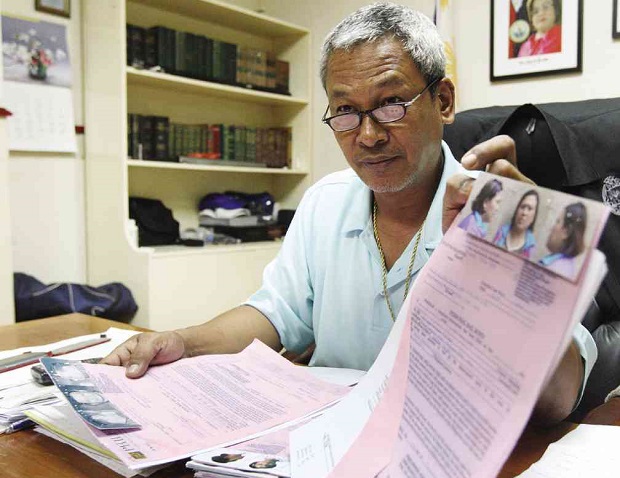
NBI CENTRAL Visayas director Max Salvador shows some documents that they got from an insurance firm that issued fake documents after a raid in Barangay Capitol Site, Cebu City. TONEE DESPOJO/CEBU DAILY NEWS
CEBU CITY—Agents of the National Bureau of Investigation in Central Visayas (NBI-7) raided an office in the city on Thursday for allegedly issuing fake bail bonds that caused the release of 10 accused after these were presented to the courts.
But no arrest was made because no one was around when a joint team from the Anti-Fraud and Action Division of the NBI central office in Manila and NBI-7 barged into a padlocked office in Francesca Dawn Building, about 25 meters from the NBI-7 office at Barangay Capitol Site, Cebu City.
The agents seized 10 fake bail bonds and five computers found in the office.
Lawyer Max Salvador, NBI-7 director, said complaints on the falsification of public documents would be filed in the city prosecutor’s office against Anthony Espinosa and Larry Steven Dagal.
The two were subjects of the search warrant issued by Judge Monique Quisumbing-Ignacio of Regional Trial Court (RTC) Branch 209 in Mandaluyong City.
Based on the 10 fake bail bonds recovered by the NBI, five persons facing illegal drug charges were released by the court.
The rest were accused of attempted murder, theft, engaging in an illegal numbers game and child abuse, which violates the Anti-Violence Against Women and their Children Act of 2004.
The recommended bail appearing on the bonds ranged from P20,000 to P200,000.
The raid stemmed from the complaint raised by Philippine Fire and Marine Insurance Corp. (Philfire Insurance), a legitimate corporate surety company, to the NBI in Manila that the name of the firm was used in the issuance of fake bail bonds.
Salvador said a series of operations were conducted in different parts of the country, since the persons misrepresenting Philfire Insurance had offices in Manila, the Bicol region and Cebu and Davao provinces.
“Their (respondents’) operations are syndicated. They are operating nationwide. The NBI has recovered a lot of their fake documents during various raids that the bureau have conducted,” he said.
Salvador said the NBI would coordinate with the RTC in Cebu City to determine if there was a need to arrest the persons released through dubious bail bonds.
A bail bond is a written promise signed by an accused or a representative of an insurance company to pay an amount fixed by court for the temporary liberty of a person accused of a crime.
It is also a method used to obtain the release of an accused from the custody of law enforcement officials while waiting for the resolution of the case.
At least three judges— Manuel Patalinghug of RTC Branch 22, James Stewart Ramon Himalaloan and Meinrado Paredes—signed the release orders of three accused whose bail bonds were fake.
Paredes, who retired last February after serving the judiciary for 27 years, said clerks of court first examined bail bonds before judges approved them. “If the bond was in order, then we would grant it,” he said.
“What happened is a wake up call for us judges to be careful in approving bonds. I think that it will be better if judges alert the bonding companies and scrutinize whether they (bonding companies) are accredited by the Supreme Court and are in good standing,” he said.
He said the 10 accused who were released through fake bail bonds would have to be rearrested because the bail bonds issued to them were null and void.